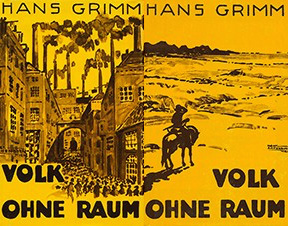Narratives and Concepts of Adventure Between Colonialism and National Socialism
Modern German Literature, LMU Munich
Principal Investigator: Prof. Dr. Susanne Lüdemann
Doctoral researcher: Elisabeth Hutter

Hans Grimm, Volk ohne Raum (A People Without Space), Wahlsburg: Klosterhaus-Verlag 1926.
The project intends to reconstruct fictional and non-fictional discourses of adventure in the German Reich between 1884 (the Reich’s entry into European colonial policy) and the advent to power of the National Socialists in 1933. It is especially interested in the ideologization of the adventure as a category of experience, insofar as it is implemented in and shaped by popular narratives.
The project has two main areas of research: the first one is concerned with the renaissance of narratives of adventure in German colonial literature; the second one focuses on Karl May and Ernst Jünger, and thus on the two authors who, on the one hand, substantially influenced the German colonial narrative (May) and who, on the other hand, essentially inherited from it (Jünger). The issue at stake is the historical continuity of colonialism and National Socialism, first claimed by Hannah Arendt (1955) under the name of the “imperial legend”.
The leading question of the project is if (and to which extent) this continuity can also be found in the history of literature; if (and to which extent) the way ‘from Sitara to the Marble Cliffs’ (Scholdt) converges with the way ‘from Windhoek to the Eastern Front’ (Zimmerer). In order to answer this question, it is (1) necessary to establish a comparative chronotopics (Bachtin) of adventure within the corpus of texts investigated. Part of it will also be a comparison with premodern narratives of adventure as investigated in projects 1-3. In addition to this diachronic inquiry of literary inheritances, the framing of the project by imperial and totalitarian concepts of power requires (2) to analyze the synchronic embeddedness of the narratives in a geopolitical imaginary which, in the period investigated, draws more and more on phantasies of a planetary order of political space.

